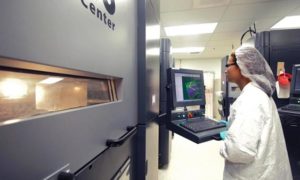Leader of Johnson & Johnson 3D Printing Center of Excellence Outlines Advantages of Customized Knee Implants
Monday, 10/16/17
Orthopedic Industry Researches Additive Manufacturing and Customized Implants, While Body of Positive Clinical Results Related to Conformis Customized Knee Implant Systems Grow
BILLERICA, Mass., Oct. 16, 2017 (GLOBE NEWSWIRE) — Conformis, Inc. (NASDAQ:CFMS), a medical technology company that offers joint replacement implants customized to fit each patient’s unique anatomy, today announced that, while the industry has begun to acknowledge the value of customized knee replacement implant systems compared to traditional off-the-shelf implant systems, it has obtained additional positive clinical data regarding the performance of its customized partial knee replacement implants.
Recently, Sam Onukuri, head of Johnson & Johnson’s 3D Printing Center of Excellence, acknowledged the advantages of customized knee implants and instruments that are developed based on a CT or MRI scan of a patient’s anatomy. In an interview generally discussing the advantages of additive manufacturing published in GE Reports by General Electric (GE) and in an “Employee Spotlight” article published by Johnson & Johnson, Onukuri noted the potential advantages of customized knee implants that may reduce both “pain and the recuperation time” compared to traditional off-the-shelf implant systems that come in a limited range of sizes. “Physicians make every effort to find the implant that fits best,” Onukuri says. “But it’s never a perfect match, and the same is true for the tools. As a result, the surgery takes longer — and so can healing and recovery — and the fit may not be perfect.” On the other hand, Onukuri noted that “customized solutions” based on patient CT or MRI scans “can achieve an exact fit for the joint.”
While the orthopedic industry researches potential customized alternatives to traditional off-the-shelf implant technology, Conformis continues to develop a growing body of positive clinical data regarding its existing customized knee implants. Most recently, in a study evaluating knee strength and mechanics that compared healthy control patients to those with either a modern off-the-shelf total knee replacement (TKR) or a customized bi-compartmental knee replacement (BKR), the authors concluded that the “study shows that BKR patients exhibit better strength and mechanics while performing activities of daily living.” According to the study results: the TKR group walked significantly slower when compared to both the BKR group and healthy controls (p < 0.05); the TKR knee had less peak extensor moment at stance than both the BKR and healthy control knees (p < 0.05); and both the BKR and healthy control knees displayed larger internal rotation at stance than that of the TKR knee (p < 0.05). The results of the study, for which Conformis provided financial support, were published online by International Orthopaedics on September 4, 2017.
“We are very pleased that the industry is now beginning to recognize the advantages and potentially transformative nature of customized knee implant and instrumentation solutions,” said Mark Augusti, Chief Executive Officer and President of Conformis. “Conformis has been a champion of customized implant technology for over a decade, and the body of clinical data demonstrating both the clinical and the economic advantages of customized total and partial knee implant systems continues to grow.”

Conformis 3D Printing and Additive Manufacturing Facility; Wilmington, MA

